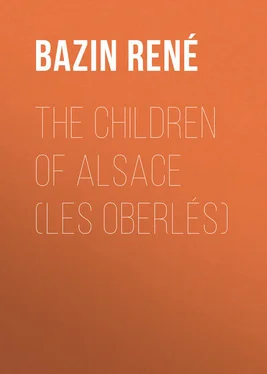René Bazin - The Children of Alsace (Les Oberlés)
Здесь есть возможность читать онлайн «René Bazin - The Children of Alsace (Les Oberlés)» — ознакомительный отрывок электронной книги совершенно бесплатно, а после прочтения отрывка купить полную версию. В некоторых случаях можно слушать аудио, скачать через торрент в формате fb2 и присутствует краткое содержание. ISBN: , Жанр: foreign_language, foreign_antique, foreign_prose, на английском языке. Описание произведения, (предисловие) а так же отзывы посетителей доступны на портале библиотеки ЛибКат.
- Название:The Children of Alsace (Les Oberlés)
- Автор:
- Жанр:
- Год:неизвестен
- ISBN:http://www.gutenberg.org/ebooks/34957
- Рейтинг книги:5 / 5. Голосов: 1
-
Избранное:Добавить в избранное
- Отзывы:
-
Ваша оценка:
- 100
- 1
- 2
- 3
- 4
- 5
The Children of Alsace (Les Oberlés): краткое содержание, описание и аннотация
Предлагаем к чтению аннотацию, описание, краткое содержание или предисловие (зависит от того, что написал сам автор книги «The Children of Alsace (Les Oberlés)»). Если вы не нашли необходимую информацию о книге — напишите в комментариях, мы постараемся отыскать её.
The Children of Alsace (Les Oberlés) — читать онлайн ознакомительный отрывок
Ниже представлен текст книги, разбитый по страницам. Система сохранения места последней прочитанной страницы, позволяет с удобством читать онлайн бесплатно книгу «The Children of Alsace (Les Oberlés)», без необходимости каждый раз заново искать на чём Вы остановились. Поставьте закладку, и сможете в любой момент перейти на страницу, на которой закончили чтение.
Интервал:
Закладка:
His son on some important question disagreed with him. Seated at table just opposite his father, M. Joseph Oberlé could make a show of addressing himself to his wife and daughter only; during the whole of the meal he could avoid seeing the fingers which moved impatiently or which wrote to Madame Oberlé, but he was not the man to keep off painful subjects. Like all those who have had to make a great decision in their lives, and who have not taken it without a profound disturbance of their conscience, he was always reverting to the German Question. Everything gave him a pretext to begin it, praise or blame – various facts, political events announced in the morning's newspaper, a visiting card brought by the postman, an order for planks received from Hanover or Dresden, the wish expressed by Lucienne to accept an invitation to some ball. He felt the need of applauding himself for what he had done, like defeated generals who want to explain the battle, and to demonstrate how the force of circumstances had compelled them to act in such or such a manner. All the resources of his fertile mind were brought to bear on this case of conscience, on which he declared himself a long time resolute, and which aroused no more discussion, either on the part of the sick grandfather or on that of the depressed wife, who had decided to keep silence.
Lucienne alone approved and supported her father.
She did it with the decision of youth, which judges without consideration the grief of old people, the memories and all the charm of the past, without understanding, and as if they were dead things to be dealt with by reason only. She was only twenty, at once very proud and very sincere; she had an artless confidence in herself, an impetuous nature, and a reputation for beauty only partly justified. Tall, like her mother, and, like her, well made, she had her father's larger features more conformed to the usual Alsatian type – with a tendency to thicken. All the lines of her body were already formed and fully developed. To those who saw her for the first time, Lucienne Oberlé gave the impression of being a young woman rather than a young girl. Her face was extremely open and mobile. When she listened, her eyes – not so large as, and of a lighter green than, her brother's, her eyes and her mouth equally sharp when she smiled – followed the conversation and told her thoughts. She dreamed little. Another charm besides the vivacity of her mind explained her social success: the incomparable brightness of her complexion, of her red lips, the splendour of her fair hair, with its shining tresses of blonde and auburn intermingled, so abundant and so heavy that it broke tortoise-shell combs, escaped from hairpins, and hung down behind in a heavy mass and obliged her to raise her brow, which was enhaloed by the light from it, and gave to Lucienne Oberlé the carriage of a proud young goddess.
Her Uncle Ulrich said to her, laughing: "When I kiss you, I think I am kissing a peach growing in the open air." She walked well; she played tennis well; she swam to perfection, and more than once the papers of Baden-Baden had printed the initials of her name in articles in which they spoke of "our best skaters."
This physical education had already alienated her from her mother, who had never been more than a good walker, and was now only a fair one. But other causes had been at work and had separated them more deeply and more irrevocably from each other. Doubtless it was the entirely German education of the Mündner school, more scientific, more solemn, more pedantic, more varied, and much less pious than that which her mother had received, who had been educated partly at Obernai, and partly with the nuns of Notre-Dame, in the convent of the rue des Mineurs in Strasburg. But above all it was owing to the acquaintances she made, and her surroundings. Lucienne, ambitious like her father, like him bent on success, entirely removed from maternal influence, entrusted to German mistresses for seven years, received in German families, living among pupils chiefly German, flattered a little by everybody – here because of the charm of her nature, there for political motives and unconscious proselytism, Lucienne had formed habits of mind very different from those of old Alsace. Once more at home, she no longer understood the past of her people or her family. For her, those who stood up for the old state of things or regretted it – her mother, her grandfather, her uncle Ulrich – were the representatives of an epoch ended, of an unreasonable and childish attitude of mind. At once she placed herself on her father's side against the others. And she suffered from it. It depressed her to be brought into such close contact with persons of this sort, whom the Mündner school and all her worldly acquaintances of Baden-Baden and Strasburg would look upon as behind the times. For two years she had lived in an atmosphere of contradiction. For her family she felt conflicting sentiments; for her mother, for example, she felt a true tenderness and a great pity because she belonged to a condemned society and to another century. She had no confidants. Would her brother Jean be one? Restless at his arrival, almost a stranger to him, desiring affection, worn out with family quarrels, and hoping that Jean would place himself on the side she had chosen, that he would be a support and a new argument, she at once desired and feared this meeting. Her father came to tell her of the conversation he had had with Jean. She had said – cried out rather – "Thank you for giving me my brother!"
They were all four at table when the young man entered the dining-room. The two women who were facing each other and in the light of the window, turned their heads, one sweetly with a smile that said, "How proud I am of my child!"; the other leaning back on her chair, her lips half open, her eyes as tender as if he had been her betrothed who entered, desirous to please and sure of pleasing him, saying aloud: "Come and sit here near me, at the end of the table. I have made myself fine in your honour! Look!" and kissing him, she said in a low tone, "Oh, how good it is to have some one young to say good morning to!" She knew she was pleasant to look upon in her bodice of mauve surah silk trimmed with lace insertion. It also gave her real pleasure to meet this brother whom she had only seen for a moment last night, before catching the train to Strasburg. Jean thanked her with a friendly glance and seated himself at the end of the table between Lucienne and his mother. He unfolded his table napkin, and the servant Victor, son of an Alsatian farmer, with his full-moon face and eyes like a little girl's, always afraid of doing something wrong, approached him, carrying a dish of hors-d'œuvre , when M. Joseph Oberlé, who had just finished writing a note in his pocket-book, stroked his whiskers and said:
"You see Jean Oberlé here present, you my father, you Monica, and you Lucienne. Well, I have a piece of news to give you concerning him. I have agreed that he shall live definitely at Alsheim and become a manufacturer and a wood merchant."
Three faces coloured at once; even Victor, shaking like a leaf, withdrew his hors-d'œuvre dish.
"Is it possible?" said Lucienne, who did not wish to let her mother see that she had already been told of the arrangement. "Will he not finish his referendary course?"
"No."
"After his year's service he will come back here for always?"
"Yes; to stay with us always."
The second moment of emotion is sometimes more unnerving than the first. Lucienne's eyelids fluttered quickly and became moist. She laughed at the same time, tender words trembling on her red lips.
"Oh," said she, "so much the better. I don't know if it is in your own interest, Jean, but for us, so much the better."
She was really pretty at that moment, leaning towards her brother, vibrating with a joy which was not feigned.
Читать дальшеИнтервал:
Закладка:
Похожие книги на «The Children of Alsace (Les Oberlés)»
Представляем Вашему вниманию похожие книги на «The Children of Alsace (Les Oberlés)» списком для выбора. Мы отобрали схожую по названию и смыслу литературу в надежде предоставить читателям больше вариантов отыскать новые, интересные, ещё непрочитанные произведения.
Обсуждение, отзывы о книге «The Children of Alsace (Les Oberlés)» и просто собственные мнения читателей. Оставьте ваши комментарии, напишите, что Вы думаете о произведении, его смысле или главных героях. Укажите что конкретно понравилось, а что нет, и почему Вы так считаете.












